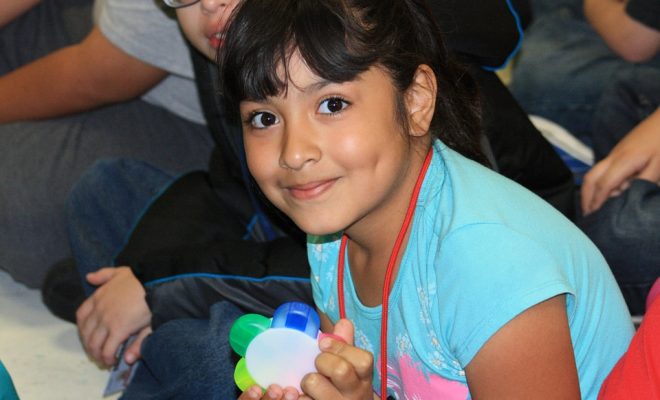How schools can help immigrant children to thrive

Jan Germen Janmaat, UCL Institute of Education
In view of the large influx of refugees from Syria and the growing concern about their integration in European societies, the launch of a new report on immigrant children in education systems could not be more timely.
The report from the Organisation for Economic Co-operation and Development (OECD), noted reassuringly that there was no relation between the amount of immigrants in a country’s education system and a decline in education standards. It’s as if the OECD were pre-empting criticism from populist anti-immigrant politicians that the influx of Syrian refugees will be a disruption to western societies, and in particular a drain on schools.
The main focus of the report is actually on the performance gap between children of immigrant background and their non-immigrant peers and what schools can do to close it. Although the achievement gap has closed across the OECD – by a semester between 2003 and 2012 – on average, immigrant students still perform worse than their peers. The OECD gives some quite explicit advice to politicians if they are serious about enhancing the performance of these children: provide additional language instruction, arrange early childhood education, prevent segregation, don’t force them to repeat grades and eliminate the early streaming (also known as tracking) of children into different ability groups.
While the first two recommendations are uncontroversial, the last suggestion is politically sensitive as there are quite a few states who practice and cherish the tracking or streaming of children. In Germany, the Netherlands and Austria, different tracks coincide with different kinds of schools, while in England, ability grouping is organised within schools in what is called setting.
Provocatively the report said: “While ability grouping, grade repetition and tracking are harmful for all students, immigrant students are more likely to be affected by these practices.“ This is likely to raise some eyebrows, particularly among political parties advocating early tracking such as the Christian Democrats in Germany and the Conservatives in the UK.
Many education researchers have stressed that early tracking only reinforces achievement gaps, not only between immigrant and non-immigrant children but also between children of different social backgrounds. As early as 1974, the French sociologist Raymond Boudon noted that the more tracks a system has and the earlier these tracks start to branch out, the greater the inequality in educational performance and the more difficult it will be for children of modest backgrounds, including many immigrants, to do well in school. In this sense the OECD can be said to be a late convert to the cause of late selection – or comprehensive education as it is more widely known.
The report also noted that early tracking on the basis of ability amounts to social and ethnic sorting and so only adds to school social and ethnic segregation, which is an observation widely shared in academia.
Segregation and achievement
Segregation is also mentioned by the OECD as another factor contributing to the performance gap. This is based on the idea that large concentrations of immigrant children give rise to peer influences that reduce performance, irrespective of the individual social and ethnic background of children. In other words, when immigrant children are surrounded by peers of the same background in school, they are doubly disadvantaged, both in terms of their own background and in terms of the backgrounds of their classmates.

Language lessons for refugee children in Germany.
Ole Spata/EPA
In mixed settings, by contrast, they should be able to learn from their more privileged peers. Desegregated schools can thus help to compensate for the effect of family disadvantage. Again this theory is not new. In 1966 a famous report by American sociologist James Coleman noted that it makes a great difference who you go to school with. This report greatly reinforced the desegregation campaign that was set in motion by the 1954 Brown vs Board of Education US Supreme Court ruling declaring that de jure segregation was “inherently unequal” and therefore unconstitutional.
What’s best for immigrant children
There is more controversy among researchers, however, about whether segregation enhances achievement gaps. In 2005, American researchers Russell Rumberger and Gregory Palardy noted that when it comes to student achievement, the social composition of schools matters much more than the racial composition. Taking a closer look at social composition they found that several school characteristics, including teacher expectations of children, the amount of homework that students do, and the number of rigorous courses that students take, explain all of the effect of social composition.
This would imply that in theory immigrant children can perform just as well in segregated schools, provided they are exposed to the very same curriculum and teaching input as their peers in mixed schools. The question, however, is whether equalising these resources across schools can be achieved in practice – as they are so inextricably bound up with the social and ethnic mix of schools.
The OECD report deserves praise for letting the data speak and ignoring possible political pressures to revise the policy messages emanating from its findings on what works to close the achievement gap. It does not deal, however, with two relevant questions of quite a different nature: namely whether the policies it recommends can be adopted in the same way in countries with different educational cultures and whether they will produce the same results across the board. This debate – a hot topic among researchers – so far remains unresolved.
![]()
Jan Germen Janmaat, Reader in Comparative Social Science, Department of Lifelong and Comparative Education, UCL Institute of Education
This article was originally published on The Conversation. Read the original article.
Click here to read all our posts concerning the Achievement Gap.






